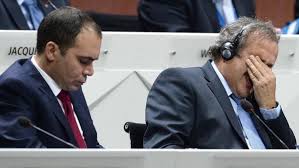By Andrew Warshaw
June 1 – Up to one third of Europe may have defied UEFA president Michel Platini’s request and voted for Sepp Blatter in last Friday’s FIFA presidential election.
Insideworldfootball has learned that Platini’s call for a unified stance against Blatter was ignored by a string of nations including Russia and much of the eastern bloc, Spain, possibly Turkey, and, as already reported, Platini’s native France.
“We believe as many as 18 Europeans may have voted for Blatter,” said a source close to Prince Ali bin al-Hussein, Blatter’s only challenger. “That’s our analysis and we are examining it.”
While Prince Ali’s performance in gaining 73 votes showed that a third of the entire 209-member FIFA electorate wanted Blatter removed after 17 years charge, the split within UEFA represents an alarming setback for Platini who always expected a handful of Europeans to vote for Blatter but not nearly so many.
Russia, who have admitted they voted for Blatter, did so mainly as a ‘thank you’ for delivering the 2018 World Cup. Spain’s long-serving FIFA vice-president Angel Villar-Llona, still being investigated by FIFA’s ethics committee over possible malpractice in the 2018 and 2022 World Cup bid process (and named as one of those the Swiss justice authorities want to question as part of their separate probe into alleged criminal mismanagement), is a staunch Blatter ally.
French FA president Noel le Graet is believed to have gone against Platini, his compatriot, largely as a “merci” for FIFA awarding his country the 2019 women’s World Cup.
It is further understood that a chunk of Prince Ali’s votes came from CONMEBOL and CONCACAF, the two confederations to which the FIFA officials named and shamed in that stunning US indictment into racketeering and bribery chiefly belonged. Africa and Asia made up the bulk of Blatter’s 133 votes.
The European split casts fresh light on next Saturday’s UEFA emergency session in Berlin on the sidelines of the Champions League final. Platini has called together his top brass to agree on co-ordinated action to counter Blatter’s victory that followed the most tempestuous corruption-tainted week in FIFA history.
Blatter’s decision (via the executive committee) not to tamper with World Cup places, having said the previous day that Oceania deserved its own full slot, is seen in some quarters as a deliberate olive branch to stop UEFA take drastic action on Saturday.
UEFA say they will examine all options including a World Cup boycott, the favoured approach of English FA president Greg Dyke and a number of English politicians. But this appears unlikely to happen.
“That’s a bad weapon and that should never be the way to solve the situation,” said German FA boss Wolfgang Niersbach, a member of FIFA’s new-look executive committee.
“After the events of the past week there was a headwind that was felt but at the end it was not strong enough to bring about the change we wanted. Within UEFA there was the impression that Prince Ali had a chance. I do not think Mr Blatter will change much.
“When you are 79 years old you have developed a style. My biggest concern is that it may not be possible for things to be peaceful. We need a strong FIFA but that is very difficult.”
Contact the writer of this story at moc.l1744970648labto1744970648ofdlr1744970648owedi1744970648sni@w1744970648ahsra1744970648w.wer1744970648dna1744970648

